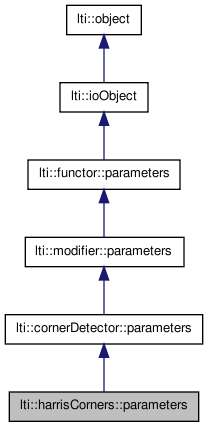

|
latest version v1.9 - last update 10 Apr 2010 |
|
the parameters for the class harrisCorners More...
#include <ltiHarrisCorners.h>


Public Member Functions | |
| parameters () | |
| parameters (const parameters &other) | |
| ~parameters () | |
| const char * | getTypeName () const |
| parameters & | copy (const parameters &other) |
| parameters & | operator= (const parameters &other) |
| virtual functor::parameters * | clone () const |
| virtual bool | write (ioHandler &handler, const bool complete=true) const |
| virtual bool | read (ioHandler &handler, const bool complete=true) |
Public Attributes | |
| float | variance |
| int | kernelSize |
| int | maximumCorners |
| float | scale |
| localMaxima< float >::parameters | localMaximaParameters |
| gradientFunctor::parameters | gradientFunctorParameters |
the parameters for the class harrisCorners
| lti::harrisCorners::parameters::parameters | ( | ) |
default constructor
Reimplemented from lti::cornerDetector::parameters.
| lti::harrisCorners::parameters::parameters | ( | const parameters & | other | ) |
copy constructor
| other | the parameters object to be copied |
Reimplemented from lti::cornerDetector::parameters.
| lti::harrisCorners::parameters::~parameters | ( | ) | [virtual] |
destructor
Reimplemented from lti::cornerDetector::parameters.
| virtual functor::parameters* lti::harrisCorners::parameters::clone | ( | ) | const [virtual] |
returns a pointer to a clone of the parameters
Reimplemented from lti::cornerDetector::parameters.
| parameters& lti::harrisCorners::parameters::copy | ( | const parameters & | other | ) |
copy the contents of a parameters object
| other | the parameters object to be copied |
Reimplemented from lti::cornerDetector::parameters.
| const char* lti::harrisCorners::parameters::getTypeName | ( | ) | const [virtual] |
returns name of this type
Reimplemented from lti::cornerDetector::parameters.
| parameters& lti::harrisCorners::parameters::operator= | ( | const parameters & | other | ) |
copy the contents of a parameters object
| other | the parameters object to be copied |
Reimplemented from lti::cornerDetector::parameters.
| virtual bool lti::harrisCorners::parameters::read | ( | ioHandler & | handler, | |
| const bool | complete = true | |||
| ) | [virtual] |
read the parameters from the given ioHandler
| handler | the ioHandler to be used | |
| complete | if true (the default) the enclosing begin/end will be also written, otherwise only the data block will be written. |
Reimplemented from lti::cornerDetector::parameters.
| virtual bool lti::harrisCorners::parameters::write | ( | ioHandler & | handler, | |
| const bool | complete = true | |||
| ) | const [virtual] |
write the parameters in the given ioHandler
| handler | the ioHandler to be used | |
| complete | if true (the default) the enclosing begin/end will be also written, otherwise only the data block will be written. |
Reimplemented from lti::cornerDetector::parameters.
In the original work by Harris and Stephens the kernel [-2 -1 0 1 2] was used to calculate the gradients in x and y directions.
However, recently Schmid et al. have found that other kernels e.g. derivatives of gaussians can give superior results (use OGD for that). To provide maximum flexibility the general gradientFunctor is used here.
The gradientFunctor::parameters::format must always be set to Cartesic. This is also default here.
Default gradient type is gradientFunctor::parameters::Harris.
Other values are the default values specified in gradientFunctor::parameters.
See also: harrisKernelX
size of the Gaussian kernel used as window for the autocorrelation
Default value: 7
A localMaxima<float> functor is used to detect the corners.
The parameters for it can be given here.
Default value: localMaxima<float>::parameters()
Maximum number of corners to be detected.
Default value: 300
Scale factor in Harris auto-correlation.
Default value: 0.04f
Variance used for the Gaussian kernel used as window for the autocorrelation.
Default value : -1 (see lti::gaussKernel1D<float>::generate() for the meaning of this)